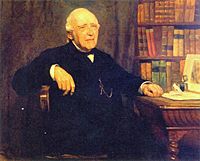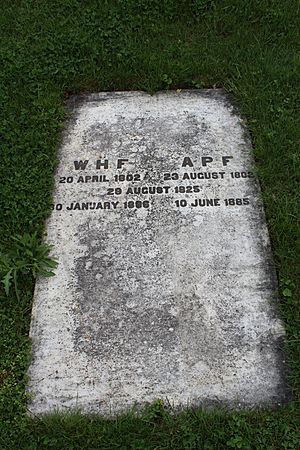William Henry Furness facts for kids
Quick facts for kids
William Henry Furness
|
|
|---|---|

Reverend Doctor William Henry Furness (1886) by Cecilia Beaux
|
|
| Born | April 20, 1802 Boston, Massachusetts, U.S.
|
| Died | January 30, 1896 |
| Resting place | Laurel Hill Cemetery, Philadelphia, Pennsylvania, U.S. |
| Nationality | American |
| Children | William Henry Furness Jr. Horace Howard Furness Frank Furness Annis Lee Furness Wister |
| Relatives | William Henry Furness III (grandson) |
| Signature | |
William Henry Furness (April 20, 1802 – January 30, 1896) was an important American leader. He was a minister, a deep thinker (called a Transcendentalist), and a strong fighter against slavery (an abolitionist). He worked hard to make society better.
Contents
Life and Work
Early Life and Education
William Henry Furness was born in Boston, Massachusetts in 1802. He went to the Boston Latin School, where he became good friends with Ralph Waldo Emerson. Emerson later became a very famous writer and thinker.
William Furness then studied at the Harvard Divinity School, finishing in 1823. He preached in different towns in Massachusetts and Maryland for a short time.
Becoming a Minister
When he was just 22 years old, William Furness became the minister of the First Unitarian Church of Philadelphia. This church had not had a minister for almost 30 years! He served there for a very long time, from 1825 until he retired in 1875.
During his time as minister, the church grew a lot. They moved to a bigger building in 1828. Later, in 1886, they moved to an even larger building. This new church was designed by his son, Frank Furness, who became a famous architect.
Fighting Against Slavery
William Furness was a very strong abolitionist. This means he believed that slavery was wrong and should be ended. He spoke out against the Fugitive Slave Act of 1850. This law made it harder for enslaved people to escape to freedom and forced people in free states to help catch them. His strong words even led to discussions about whether he should be charged with treason (betraying his country).
In 1859, he was an important speaker at a special event in Philadelphia. This event honored John Brown, who had tried to start a rebellion to free enslaved people.
After Senator Charles Sumner, who also fought against slavery, was badly beaten in the Senate, he stayed at the Furness home while he was getting better.
Other Interests and Family
In 1840, William Furness was chosen to be a member of the American Philosophical Society. This is a group of smart people who discuss important ideas.
He spent a lot of time studying the life of Jesus. He wrote several books about Jesus. He believed that the miracles described in the Bible were actually natural events that could be explained. He also wrote many popular hymns (religious songs).
William Furness also worked to build bridges between different communities. He reached out to the Jewish community in Philadelphia. His son Frank even designed a new building for Congregation Rodeph Shalom, a Jewish synagogue.
In 1825, he married Annis P. Jenks. They had four children who all became successful:
- William Henry Furness, Jr. was a portrait painter.
- Horace Howard Furness became a famous expert on Shakespeare.
- Frank Furness was one of Philadelphia's most important architects.
- Annis Lee Furness Wister was an author and translator.

William Henry Furness passed away on January 30, 1896. He was buried at Laurel Hill Cemetery in Philadelphia.
Images for kids
 | Claudette Colvin |
 | Myrlie Evers-Williams |
 | Alberta Odell Jones |




